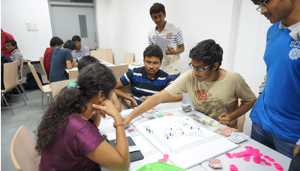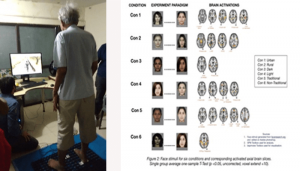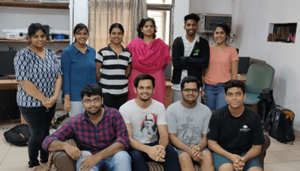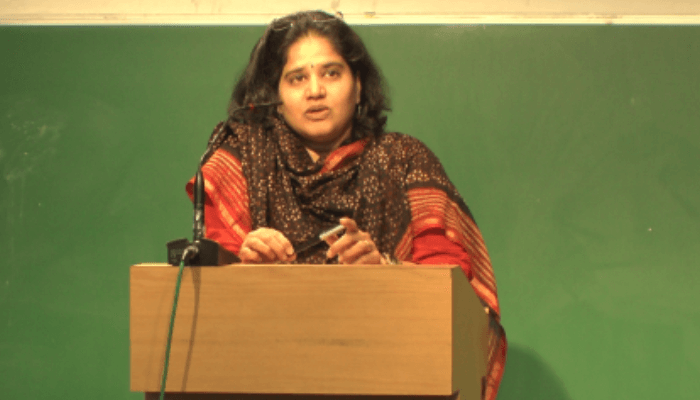Dr. Kavita Vemuri has many tales to tell. But she would rather just chat about them than see herself in a formal feature. Not many know that she first arrived on IIITH campus to help set up the Centre for Innovation and Entrepreneurship (CIE) and later went on to spearhead the Cognitive Sciences research centre. Find out more about the professor who not only walks the talk but whose stern disciplinary demeanour belies the fuzz inside.
Dr. Kavita Vemuri has just pulled two fruit cakes out of the oven on a late Saturday evening and exhales deeply indicating that she’s ready for our scheduled telephonic conversation. The mental picture of domesticity this exudes seems a little incongruous coming from this no-nonsense professor. “I just sent students an extremely nasty email about not attending online classes,” she remarks, continuing half-jokingly,” Perhaps you should speak to the students who are finishing up their thesis and seeing a side of me that they thought never existed!”. The tough exterior however belies the warm relationship she shares with the students. As someone who has dabbled in and donned several different avatars before settling into the current one of a professor, she is known to exhort students to ‘seize the day’.
#YOLO
“There are very few people in the world who get to do what they really want. But I have no complaints. I think the only thing one can learn from my life is to experiment,” she says, referring to her own eclectic career path, forged by constantly challenging herself and fearlessly stepping out of her comfort zone. From working in a newspaper office while pursuing a degree and later becoming an Assistant Editor at University Press of Orient Longman, to working in areas of fibre-optic communication as research scientist, to consulting the Uttaranchal government on bringing in electric vehicles, to setting up small scale units across Tamil Nadu as part of the CII-Tamil Nadu driven technology development centre, she’s been there and done that. It was the experience in the latter that brought her to IIITH. Not as a professor. But as someone responsible for setting up the Centre for Innovation and Entrepreneurship (CIE) in 2008. “We were the first non-IIT-IIM incubator in the country. I ran it for around 4.5 years. By the time I left, there were 20 companies and good enough funding along with the required visibility,” she says. Spare time on her hands while helming the incubating centre found her doubling up as an instructor of Product Design and Engineering. Simultaneously she also began her PhD in Cognitive Sciences. Incidentally it was her third and successful attempt at a PhD. The first two were in Physics and Electrical Engineering respectively. “Halfway through my PhD in Physics, I got bored and just quit. The second time around, when I was pursuing my PhD in Electrical Eng, the advisor left so I abandoned the process too,” she says, without remorse. Ironically, the third time too at IIITH, her advisor relocated to another country. However, this time not only did it leave her learning process unaffected, but also she took up the responsibility of getting the Cognitive Sciences lab going. “One needs to do things that are right for research or for students even when not given the role formally. It defines what we are,” she states matter-of-factly.

Serious Games
“Now, i am an experimentalist, I wanted Cognitive Sciences to extend the Computer Science or Electronics curriculum by focusing on experimental studies,” she says, explaining the genesis of the now-well known Serious Games lab. But why games? Besides the fact that Kavita is an avid gamer herself, while teaching students Product Design and Engineering, she realised that they understood the concepts better when explained in terms of games. “For them, they saw it as a whole lifecycle. You start with the idea of a game, go on to build a prototype, test it, go back and rebuild it. We designed many physical things at the time. There was a carpenter who used to help. And that’s how we made many different things from physical bats to board games of whatever students designed,” she says. While the initial idea was to build educational games, she quickly realised that there was no immediate need for such games in the market that was already witnessing a surfeit of the same. It was then that CMC Vellore, which has a significantly large rehabilitation centre, proposed the design of games for neuro-rehabilitation of stroke victims. The idea was to design and build physical interfaces such as an electronic mat where patients could walk in conjunction with wearable sensors or gesture and movement recognition sensors that provided feedback on whether they were actually putting enough weight on either of their feet. While that’s how it all started, these games are now tested out in a clinic in Hyderabad and have been designed based on the requirements of the doctor associated with it. One of the current projects uses EEG signals for post-stroke recovery via games. The team is also working on spine kinematics, that is, using motion capture technique to develop models for clinical diagnosis and intervention. Kavita mentions that in addition to this, the lab has been instrumental in designing simulations of sand box exercises for the Army too.

Empathy
A large part of Kavita’s research focus has been on the study of empathy which first began while writing her own thesis. “It was on narrative empathy,” she says. For this, she studied parts of the brain that get activated when one feels empathetic. While her thesis studied the effects on subjects immersed in a movie-watching experience, an on-going project is looking at rape empathy. “We are trying to understand how ‘ordinary’ individuals (not necessarily rapists) like us empathise with a rape victim. We’re interested not in the rape victim per se, but the society and people who have to be the first responders to a rape victim. Or more importantly the socio-cultural biases in responses that are ‘wired’ from neural signals, “ she explains. This is based on existing (non-Indian) initial studies of rape acceptance, or social biases towards a victim. The first set of experiments conducted by Kavita looked at the role of professions of rape victims and analyzed the brain’s responses in the empathetic area. “We know that class biases exist. We look at a bar dancer and instantly we form a social structure for her in our head. It’s not breaking news that such biases exist but the fact that it exists at the subconscious or brain level, where we’ve already normalized these things, is what we wanted to show,” she says. Similar experiments were conducted to see effects of facial features (traditional looking versus non-traditional looking), skin tone (fair versus dark) and the kind of clothing worn by the victims (a skirt versus a pair of jeans). “We also conducted an extension of that study which was on the brain changes after you watch item songs. We were initially showing images of women, then an item song and then a normal dance with no overt sexual gestures,” she says. This research is a work in progress with the final goal of examining the structures of convicted offenders, particularly early neuro-markers underlying deviant behaviour. For Kavita, it will answer the question about whether it’s just empathy that is missing in the offender or some control mechanism that makes him different from the rest of us.

New Frontiers
Kavita and her students are also engaged in a study on the effects of substance abuse on rape. But a newer field that has her excited is NeuroEconomics, where the researchers are trying to understand risk-taking behaviour in different financial circumstances. For instance, they are looking at different scenarios in the financial world where an investment decision rests on factors such as trust, and emotions. “We have also forayed into algorithmic stock prediction and human trust, a new area that students were interested in. Essentially Neuro-Economics is a lot like gaming because we design games also on the same aspects. The broad area is in the human decision-making process,” says Kavita. The role of trust again forms the centrepiece of a recent work on credibility of news sources and click baits that was accepted at a prestigious IEEE conference. When she says that exploration and curiosity drives her rather than strict formal structures of the way research is meant to be done, she amply demonstrates it through her diverse research. A significant volume of research has also been undertaken on color perception, particularly hue-scaling by a unique method developed in her lab. In the area of clinical intervention, a system for measuring binocular vision disparity using VR HMD (head-mounted display) has been tested and a patent been filed for too. In addition to all this, with her proclivity to health monitoring, she is actively involved in the IoT project too on that front.
Coffee And Conversations
All of 52, it comes as a surprise when Kavita talks of hanging up her boots and making way for younger blood. “Now in research, it is all about starting very young. By the time you are 40 or so, you should have arrived. That’s the way it is, in terms of funding too,” she shrugs. But if not professor-giri, what then? “I love coffee,” she says, adding for emphasis, “I’m a South Indian from Karnataka ..so good filter coffee. I’m old school where we used to spend hours discussing anything from Politics to Science to Physics to just about anything over a cup of coffee. So, I’d like to settle down far away in my home state, have a cafe with plenty of books to read, and have my afternoon discussions.” But this doesn’t imply that she is doing away with curiosity for all things under the sun yet. She plans to set up a NeuroEconomics lab that will add to the research repertoire of the existing labs and supplement student interest. Behind the stern countenance, Kavita’s fair and non-judgemental outlook make her a student favourite. When they approach her with their research interests, she fits the human cognition part to help them achieve it, a perpetual student herself.

The cakes have been cooling for over an hour now and ready to be shared with lucky friends and neighbours. “I always wanted to bake, especially the fruit cakes that are typically found in Bangalore. Thanks to the lockdown, I got myself a better oven and tried out different recipes,” she smiles. As she signs off, there’s a sense of satisfaction of a journey unravelling well, with intention and sans regret.

Sarita Chebbi is a compulsive early riser. Devourer of all news. Kettlebell enthusiast. Nit-picker of the written word especially when it’s not her own.


Comments(1)
Next post